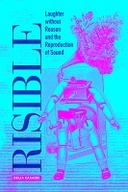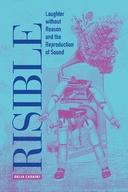Explore

Risible explores the forgotten history of laughter, from ancient Greece to the sitcom stages of Hollywood. Delia Casadei approaches laughter not as a phenomenon that can be accounted for by studies of humor and theories of comedy but rather as a technique of the human body, knowable by its repetitive, clipped, and proliferating sound and its enduring links to the capacity for language and reproduction. This buried genealogy of laughter re-emerges with explosive force thanks to the binding of laughter to sound reproduction technology in the late nineteenth century. Analyzing case studies ranging from the early global market for phonographic laughing songs to the McCarthy-era rise of prerecorded laugh tracks, Casadei convincingly demonstrates how laughter was central to the twentieth century’s development of the very category of sound as not-quite-human, unintelligible, reproductive, reproducible, and contagious.
“A virtuoso meditation on laughter, music, and sound reproduction, moving from transfixing insights to a bold vision of laughter as a sonorous force that troubles our conceptions of humanity and rationality. How sounds acquire meaning, how they make sense or nonsense or lie somewhere between the two: Delia Casadei’s Risible considers these fundamental issues in startling and thought-provoking ways.” — CAROLYN ABBATE, coauthor of A History of Opera
“A thrillingly unclassifiable and profound work of cultural theory. Casadei reveals how laughter holds relevance for every dimension of life and its biopolitical regulation via gender, race, labor, and reproduction. She also reminds us that there is much genealogical work yet to be done on mediatized, electrified soundworlds of the twentieth century and offers a powerful, welcoming push in new directions.” — AMY CIMINI, author of Wild Sound: Maryanne Amacher and the Tenses of Audible Life
This book is included in DOAB.
Why read this book? Have your say.
You must be logged in to comment.

